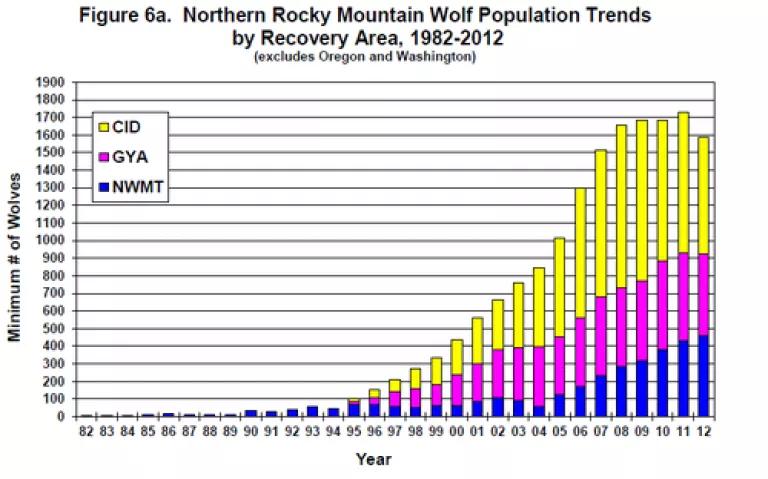
According to the Salt Lake Tribune, the Utah legislature is poised to pay a political action group called Big Game Forever $300,000 to lobby in favor of removing wolves from the endangered species list in the lower-48. That would make a total of $800,000 that Utah has given the group for similar efforts since 2010. NRDC opposes delisting wolves nationally for many reasons. But Big Game Forever’s lobbying efforts aside, the generous arrangement Big Game Forever appears to have with the state is troubling—both because of a lack of accountability for how the money is being spent, and because taxpayer dollars are funding the efforts of a group that is perpetuating mistruths about wolves and wildlife.
First, it is not clear how the money is even being used. Utah awarded Big Game Forever a similar contract last year. In its report explaining how that money was spent, Big Game Forever devoted a mere three pages (including pictures and block quotes) to vaguely describing a few activities the organization has been involved in for years—without any indication of how, or whether, the $300,000 was used to pay for them. Likewise, Big Game Forever has provided scant detail about how it intends to spend the next $300,000. Also, disturbingly, these payments come on the heels of a 2012 check for more than a million dollars from Big Game Forever's founding partner Sportsmen for Fish and Wildlife made out to Utah’s Division of Wildlife.
Equally unsettling are the inaccurate messages about wolves and wildlife Big Game Forever conveys on its website (and, presumably, through its lobbying efforts). Big Game Forever falsely claims that “wolf populations are doubling every 3 to 4 years,” and that “[w]olf overpopulation is dramatically damaging and even eliminating entire populations of Moose, Rocky Mountain Elk and other large ungulate populations.” In fact, the northern Rockies wolf population declined significantly from 2011 to 2012, and hovered around 1600 to 1700 wolves for several years prior (see graph below). Also, as I’ve written before, in the vast majority of hunting districts in, for example, Montana and Idaho, elk populations are at or above state game management objectives. (And for those areas where numbers are below objective or decreasing, let’s remember that many factors other than wolves affect ungulate populations, such as habitat loss, development, severe winter weather, other predators, fire suppression, drought, and hunter harvest.)

Big Game Forever bemoans the decline of some ungulate populations like the Northern Yellowstone elk herd, which became artificially large after humans eradicated native predators. But unnaturally big and dense elk herds are not a good thing. They foster increased infectious disease transmission, and overgraze vegetation. Since the reintroduction of wolves in Yellowstone National Park, for example, studies have shown that elk use of riparian willow habitat in the park has declined, producing benefits to a wide range of wildlife such as beavers and songbirds. Thus, the decrease in the size of these elk herds has benefited both elk and their habitat.
Further, contrary to what Big Game Forever would have us (and Utah legislators, and Congress) believe, wolves directly benefit elk populations by keeping them healthy. Predation studies have shown that wolves preferentially prey upon young, old, or physically impaired wildlife, which may no longer be contributing to population maintenance or growth. Also, many experts think wolves will help stop the spread of chronic wasting disease (“CWD”) as it moves farther west. According to Yellowstone Park biologist Doug Smith, “Wolves are probably the single best way to stop the spread of CWD. Chronic wasting disease causes animals to act weird. Wolves kill animals like that.”
Some Utah legislators have rightly called for an audit to determine how, exactly, Big Game Forever has been spending Utah taxpayer dollars. On September 18, 2013, the Natural Resources, Agriculture and Environment Interim Committee will hold a hearing to address the issue. In the meantime, Utah taxpayers can tell members of the committee that Big Game Forever should not receive another dime pending the results of the audit, and a full explanation of how the money was used. Equally important, Utahns should take the opportunity to remind their representatives of the truth. Wolves are a critically important and beneficial component of balanced ecosystems (and healthy ungulate populations); and places like Utah, where vast swaths of remote mountain valleys still remain, are exactly where wolves belong.
